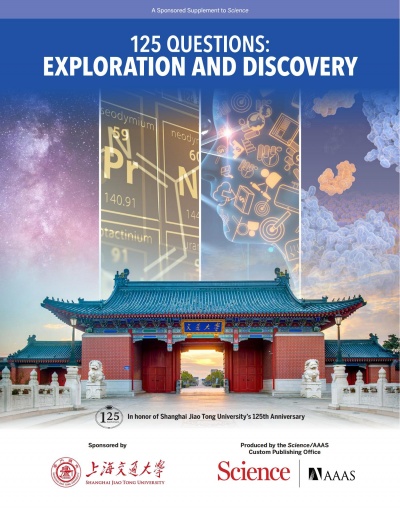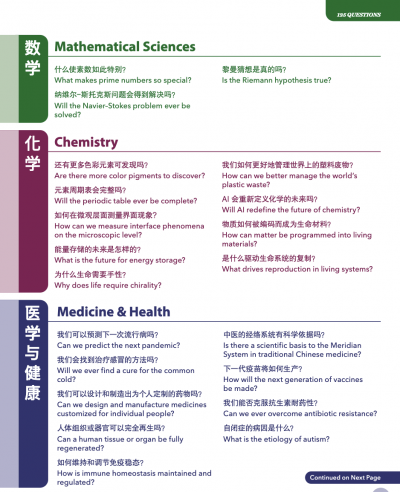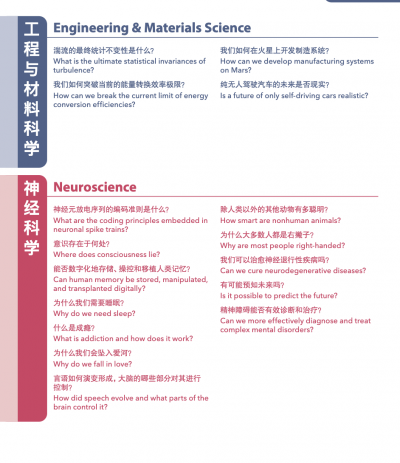科学前沿的125个问题(2021)
美国《Science》(科学)杂志曾于创刊125周年(2005年)之际发布过125个推动基础科学研究的科学难题,对指引其后十几年的科学发展产生积极影响。
16年过去了,科技发展日新月异,科学突破层出不穷,许多问题得到一定程度的解答,一些问题更深入。
在上海交通大学建校125周年之际,2021年4月10日,上海交通大学携手《科学》杂志发布了“新125个科学问题”——《125个科学问题:探索与发现(125 questions: Exploration and discovery)》。
→ 美国《Science》(科学)杂志 原版: 《125个科学问题:探索与发现(125 questions: Exploration and discovery)》
此次发布的问题包括数学、化学、医学与健康、生命科学、天文学、物理学、信息科学、工程与材料科学、神经科学、生态学、能源科学与人工智能等领域。
此次125个科学问题的征集、《科学》杂志专刊发布,作为上海交通大学建校125周年纪念活动之一。问题征集结合国际前沿、全球共需、科学发展,聚焦前瞻重大科学问题,面向科学家、学生、社会征集。世界顶尖科学家协会也发挥资源优势,邀请诺贝尔奖、沃尔夫奖、拉斯克奖、图灵奖、麦克阿瑟天才奖等世界“最强大脑”共同参与,共同讨论人类当前与未来面对的科学问题。
《Science》在发布这《125 questions: Exploration and discovery(125个科学问题:探索与发现)》时说:
- It is fundamental to the human condition to ask questions, to be inquisitive. It is essential to how we have evolved and thrived as a species. The act of asking questions is often less a search for answers and more an attempt to find meaning in our world and connection with the plants, animals, insects, and even microbes with which we share our planet. Asking questions sparks curiosity, leading to more questions and deeper investigation. That is the aim of this project, together with Shanghai Jiao Tong University, which is celebrating its 125th anniversary—to stimulate the reader’s minds, ignite their curiosity, and encourage them to challenge what we think we know about our world.
- This booklet contains 125 questions, big and small, culled from many hundreds received from editors at Science, preeminent researchers in many fields, our partners at Shanghai Jiao Tong University, and many young, inquisitive minds (received through an online survey). Although, as you might expect, these answers often simply raise more questions!
- 提出问题、保持好奇心是人类生活的基础。这对于我们作为一个物种如何进化和繁荣至关重要。提出问题的行为通常不是寻找答案,而是试图在我们的世界中寻找意义以及与我们共享地球的植物、动物、昆虫甚至微生物的联系。提出问题会激发好奇心,从而导致更多问题和更深入的调查。这就是该项目与庆祝建校 125 周年的上海交通大学一起的目标——激发读者的思想,点燃他们的好奇心,并鼓励他们挑战我们认为我们对世界的了解。
- 这本小册子包含 125 道大大小小的问题,这些问题是从 Science 的编辑、许多领域的杰出研究人员、我们在上海交通大学的合作伙伴以及许多充满好奇心的年轻人(通过在线调查获得)收到的数百个问题中挑选出来的。尽管如您所料,这些答案通常只会引发更多问题!
SJTU & Science 125个科学问题:
Mathematical Sciences — 数学
1. What makes prime numbers so special? 什么使素数如此特别?
2. Will the Navier–Stokes problem ever be solved? 纳维尔-斯托克斯问题会得到解决吗?
3. Is the Riemann hypothesis true? 黎曼猜想是真的吗?
Chemistry — 化学
1. Are there more color pigments to discover? 还有更多色彩元素可发现吗?
2. Will the periodic table ever be complete? 元素周期表会完整吗?
3. How can we measure interface phenomena on the microscopic level? 如何在微观层面测量界面现象?
4. What is the future for energy storage? 能量存储的未来是怎样的?
5. Why does life require chirality? 为什么生命需要手性?
6. How can we better manage the world's plastic waste? 我们如何更好地管理世界上的塑料废物?
7. Will AI redefine the future of chemistry? AI会重新定义化学的未来吗?
8. How can matter be programmed into living materials? 物质如何被编码而成为生命材料?
9. What drives reproduction in living systems? 是什么驱动生命系统的复制?
Medicine & Health — 医学与健康
1. Can we predict the next pandemic? 我们可以预测下一次流行病吗?
2. Will we ever find a cure for the common cold? 我们会找到治疗感冒的方法吗?
3. Can we design and manufacture medicines customized for individual people? 我们可以设计和制造出为个人定制的药物吗?
4. Can a human tissue or organ be fully regenerated? 人体组织或器官可以完全再生吗?
5. How is immune homeostasis maintained and regulated? 如何维持和调节免疫稳态?
6. Is there a scientific basis to the Meridian System in traditional Chinese medicine? 中医的经络系统有科学依据吗?
7. How will the next generation of vaccines be made? 下一代疫苗将如何生产?
8. Can we ever overcome antibiotic resistance? 我们能否克服抗生素耐药性?
9. What is the etiology of autism? 自闭症的病因是什么?
10. What role does our microbiome play in health and disease? 我们的微生物组在健康和疾病中扮演什么角色?
11. Can xenotransplantation solve the shortage of donor organs? 异种移植能否解决供体器官的短缺问题?
Biology — 生命科学
1. What could help conservation of the oceans? 什么可以帮助保护海洋?
2. Can we stop ourselves from aging? 我们可以阻止自己衰老吗?
3. Why can only some cells become other cells? 为什么只有一些细胞会变成其他细胞?
4. Why are some genomes so big and others very small? 为什么有些基因组非常大而另一些却很小?
5. Will it be possible to cure all cancers? 有可能治愈所有癌症吗?
6. What genes make us uniquely human? 哪些基因使我们人类与众不同?
7. How do migratory animals know where they're going? 迁徙动物如何知道它们要去哪里?
8. How many species are there on Earth? 地球上有多少物种?
9. How do organisms evolve? 有机体是如何进化的?
10. Why did dinosaurs grow to be so big? 为什么恐龙长得如此之大?
11. Did ancient humans interbreed with other human-like ancestors? 远古人类是否曾与其他类人祖先杂交?
12. Why do humans get so attached to dogs and cats? 人类为什么会对猫狗如此着迷?
13. Will the world's population keep growing indefinitely? 世界人口会无限增长吗?
14. Why do we stop growing? 我们为什么会停止生长?
15. Is de-extinction possible? 能否复活灭绝生物?
16. Can humans hibernate? 人类可以冬眠吗?
17. Where do human emotions originate? 人类的情感源于何处?
18. Will humans look physically different in the future? 未来人类的外貌会有所不同吗?
19. Why were there species explosions and mass extinction? 为什么会发生物种大爆发和大灭绝?
20. How might genome editing be used to cure disease? 基因组编辑将如何用于治疗疾病?
21. Can a cell be artificially synthesized? 可以人工合成细胞吗?
22. How are biomolecules organized in cells to function orderly and effectively? 细胞内的生物分子是如何组织从而有序有效发挥作用的?
Astronomy — 天文学
1. How many dimensions are there in space? 空间中有多少个维度?
2. What is the shape of the universe? 宇宙的形状是怎样的?
3. Where did the big bang start? 大爆炸从何处开始?
4. Why don't the orbits of planets decay and cause them to crash into each other? 为什么行星的轨道不衰减并导致它们相互碰撞?
5. When will the universe die? Will it continue to expand? 宇宙何时消亡?它会继续膨胀吗?
6. Is it possible to live permanently on another planet? 我们有可能在另一个星球上长期居住吗?
7. Why do black holes exist? 为什么存在黑洞?
8. What is the universe made of? 宇宙是由什么构成的?
9. Are we alone in the universe? 我们是宇宙中唯一的生命体吗?
10. What is the origin of cosmic rays? 宇宙射线的起源是什么?
11. What is the origin of mass? 物质的起源是什么?
12. What is the smallest scale of space-time? 时空的最小尺度是多少?
13. Is water necessary for all life in the universe, or just on Earth? 水是宇宙中所有生命所必需的么,还是仅对地球生命?
14. What is preventing humans from carrying out deep-space exploration? 是什么阻止了人类进行深空探测?
15. Is Einstein's general theory of relativity correct? 爱因斯坦的广义相对论是正确的吗?
16. How are pulsars formed? 脉冲星是如何形成的?
17. Is our Milky Way Galaxy special? 我们的银河系特别吗?
18. What is the volume, composition, and significance of the deep biosphere? 深层生物圈的规模、组成和意义是什么?
19. Will humans one day have to leave the planet (or die trying)? 人类有一天会不得不离开地球吗(还是会在尝试中死去)?
20. Where do the heavy elements in the universe come from? 宇宙中的重元素来自何处?
21. Is it possible to understand the structure of compact stars and matter? 有可能了解致密恒星和物质的结构吗?
22. What is the origin of the high-energy cosmic neutrinos? 高能宇宙中微子的起源是什么?
23. What is gravity? 什么是重力?
Physics — 物理学
1. Is there a diffraction limit? 有衍射极限吗?
2. What is the microscopic mechanism for high-temperature superconductivity? 高温超导的微观机理是什么?
3. What are the limits of heat transfer in matter? 物质传热的极限是什么?
4. What are the fundamental principles of collective motion? 集体运动的基本原理是什么?
5. What are the smallest building blocks of matter? 什么是物质的最小组成部分?
6. Will we ever travel at the speed of light? 我们会以光速行驶吗?
7. What is quantum uncertainty and why is it important? 什么是量子不确定性,为什么它很重要?
8. Will there ever be a "theory of everything"? 会有“万有理论”吗?
9. Why does time seem to flow in only one direction? 为什么时间似乎只朝一个方向流动?
10. What is dark matter? 什么是暗物质?
11. Can we make a real, human-size invisibility cloak? 我们可以制作出真人大小的隐形斗篷吗?
12. Are there any particles that behave oppositely to the properties or states of photons? 是否存在与光子性质或状态相反的粒子?
13. Will the Bose-Einstein condensate be widely used in the future? 玻色-爱因斯坦冷凝体未来会被广泛使用吗?
14. Can humans make intense lasers with incoherence comparable to sunlight? 人类能制造出与太阳光相似的非相干强激光吗?
15. What is the maximum speed to which we can accelerate a particle? 我们最多可以将粒子加速到多快?
16. Is quantum many-body entanglement more fundamental than quantum fields? 量子多体纠缠比量子场更基本吗?
17. What is the optimum hardware for quantum computers? 量子计算机的最佳硬件是什么?
18. Can we accurately simulate the macro- and microworld? 我们可以精确模拟宏观和微观世界吗?
Information Science — 信息科学
1. Is there an upper limit to computer processing speed? 计算机处理速度是否有上限?
2. Can AI replace a doctor? AI可以代替医生吗?
3. Can topological quantum computing be realized? 拓扑量子计算可以实现吗?
4. Can DNA act as an information storage medium? DNA可以用作信息存储介质吗?
Engineering & Material Science — 工程与材料科学
1. What is the ultimate statistical invariances of turbulence? 湍流的最终统计不变性是什么?
2. How can we break the current limit of energy conversion efficiencies? 我们如何突破当前的能量转换效率极限?
3. How can we develop manufacturing systems on Mars? 我们如何在火星上开发制造系统?
4. Is a future of only self-driving cars realistic? 纯无人驾驶汽车的未来是否现实?
Neuroscience — 神经科学
1. What are the coding principles embedded in neuronal spike trains? 神经元放电序列的编码准则是什么?
2. Where does consciousness lie? 意识存在于何处?
3. Can human memory be stored, manipulated, and transplanted digitally? 能否数字化地存储、操控和移植人类记忆?
4. Why do we need sleep? 为什么我们需要睡眠?
5. What is addiction and how does it work? 什么是成瘾?
6. Why do we fall in love? 为什么我们会坠入爱河?
7. How did speech evolve and what parts of the brain control it? 言语如何演变形成,大脑的哪些部分对其进行控制?
8. How smart are nonhuman animals? 除人类以外的其他动物有多聪明?
9. Why are most people right-handed? 为什么大多数人都是右撇子?
10. Can we cure neurodegenerative diseases? 我们可以治愈神经退行性疾病吗?
11. Is it possible to predict the future? 有可能预知未来吗?
12. Can we more effectively diagnose and treat complex mental disorders? 精神障碍能否有效诊断和治疗?
Ecology — 生态学
1. Can we stop global climate change? 我们可以阻止全球气候变化吗?
2. Where do we put all the excess carbon dioxide? 我们能把过量的二氧化碳存到何处?
3. What creates the Earth's magnetic field (and why does it move)? 是什么创造了地球的磁场(为什么它会移动)?
4. Will we be able to predict catastrophic weather events (tsunami, hurricanes, earthquakes) more accurately? 我们是否能够更准确地预测灾害性事件(海啸、飓风、地震)?
5. What happens if all the ice on the planet melts? 如果地球上所有的冰融化会怎样?
6. Can we create an environmentally friendly replacement for plastics? 我们可以创造一种环保的塑料替代品吗?
7. Can we achieve a situation where essentially every material can be recycled and reused? 几乎所有材料都可以回收再利用是否可以实现?
8. Will we soon see the end of monocultures like wheat, maize, rice, and soy? 我们会很快看到小麦、玉米、大米和大豆等单一作物的终结吗?
Energy Science — 能源科学
1. Could we live in a fossil-fuel-free world? 我们可以生活在一个去化石燃料的世界中吗?
2. What is the future of hydrogen energy? 氢能的未来是怎样的?
3. Will cold fusion ever be possible? 冷聚变有可能实现吗?
Artificial Intelligence — 人工智能
1. Will injectable, disease-fighting nanobots ever be a reality? 可注射的抗病纳米机器人会成为现实吗?
2. Will it be possible to create sentient robots? 是否有可能创建有感知力的机器人?
3. Is there a limit to human intelligence? 人类智力是否有极限?
4. Will artificial intelligence replace humans? 人工智能会取代人类吗?
5. How does group intelligence emerge? 群体智能是如何出现的?
6. Can robots or AIs have human creativity? 机器人或 AI 可以具有人类创造力吗?
7. Can quantum artificial intelligence imitate the human brain? 量子人工智能可以模仿人脑吗?
8. Could we integrate with computers to form a human-machine hybrid species? 我们可以和计算机结合以形成人机混合物种吗?
2021年4月10日下午,“SJTU & Science 125个科学问题发布暨未来科技论坛”在上海交通大学举行,上海交通大学与《科学》/美国科学促进会联袂策划发行《125个科学问题——探索与发现》增刊,面向全球发布125个科学问题。
《科学》系列期刊出版人Bill Moran通过视频向上海交大建校125周年表示祝贺。他回忆说,2005年,《科学》在其创刊125周年之际,公布了125个最具挑战性的科学问题。这些问题涵盖地球科学、能源、宇宙领域,并涉及数学与计算机科学、政治与经济、能源、环境和人口等领域,至今仍有积极广泛的影响。《科学》当时指出,在未来25年内,科学家很有希望找到这些重要基础性问题的答案,科学界也因此面临挑战。
“距离2005年提出125个问题已经过去了16年,我想,到了一个时间去回顾曾经的问题,并重新推出新版的125个问题。”《科学》/美国科学促进会国际合作总监初晓英在会上说,这次的问题反映国内关心的情况更多一点,而提问也是进一步拓宽科学的边界、推动边界去前行的方式,人们对世界的了解也会随之更深广。
问题征集的消息发布后,得到了全球科学家、青年学者、世界顶尖科学家协会等学术组织的积极响应,问题凝聚了《科学》/美国科学促进会编辑与学术圈、诺贝尔奖、沃尔夫奖、拉斯克奖、图灵奖、麦克阿瑟天才奖获得者等全球知名科学家和青年学者、上海交大师生,以及社交媒体的共同智慧。此次问题涉及数学、化学、医学健康、生命学科、天文学、物理学、信息科学、材料科学、神经科学、生态学、能源科学和人工智能多个领域,学科领域丰富。
会议现场,10位上海交大的科学问题贡献者作为代表被颁发了证书,其中,来自上海交通大学致远学院的吴越是唯一的本科生代表,他参与贡献的 "元素周期表会完整吗?"被收录进最终入选的125个科学问题中。
“巨大的变化在许多科学领域发生,现在正是回顾过往和展望未来的大好时机(great time),来寻找科学灵感。我相信这些问题将成为代表未来的年轻人思考的重要部分。”“此次125个科学问题的提出,对于推动自由探索、激发全球智慧、培养青年人才、启迪未来发展具有深远的影响。”世界顶尖科学家协会副主席、2013年诺贝尔化学奖的主Michael Levitt在致辞中说到。
参见
返回:
● 知识主题 >>







